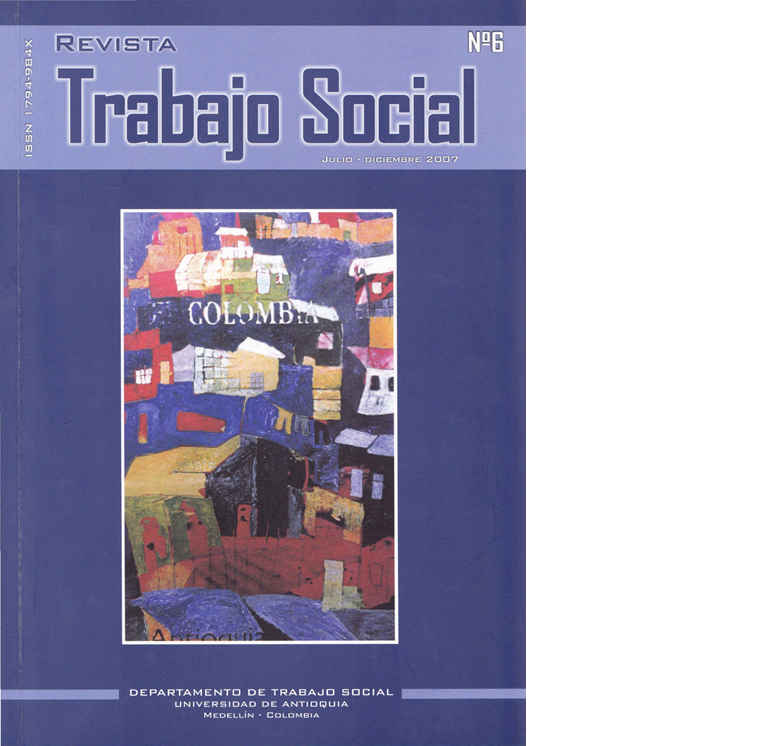Construction and deconstruction of a pedagogical experience in the field of formative research in social work.
Keywords:
formative investigation, process, exploration thematic linesAbstract
This article is the description of an investigation experience built with and for social work students in the University of Antioquia, from which it was and is possible to develop a process that could allowe to build academic groups in exploration thematic lines, where reflection and collective construction. could make possible studies in tune with particular contexts and, above all, to generate an investigation process, in which the purpose would be to learn to develop investigation with academic, ethic-political and metodological criteria, proper ofsocial work. All this implicates to get over the concepÚon that comes with students and sorne teachers, who keep considering that the objective of the formative investigation in the last pregrado levels, is just for the fulfilment of the graduation piece of work.
Downloads
References
Ayuste, Ana. Flecha, Ramón y Otros. Planteamientos de la pedagogía crítica. Comunicar y transformar. España: Grao. 1999.
Bruner, Jerome. La elaboración del sentido. Editorial Paidós, Barcelona, 1990, pp. 10-28.
Fals Borda, Orlando. La Investigación Acción Participativa. Inicios y Desarrollos. Cooperativa editorial Magisterio. Lima, Perú, 2003.
Freire, Paulo. La Naturaleza Política de la Educación. Cultura, poder y liberación. Introducción Henry Giroux. Barcelona, Buenos Aires, México: Ediciones Paidós, 1990, p. 89.
Freire, Paulo. Política y Educación. México: Siglo veintiuno editores, 1996, p. 35.
Geertz, Clifford. La interpretación de las culturas. Gedisa, Barcelona. 1992, pp. 5-20.
Gergen, Kenneth. El yo saturado. Dilemas de identidad en el mundo contemporáneo. Paidós Barcelona, 2002, p. 25.
Ghiso, Alfredo y Mejía Marco Raúl. Sistematización de Experiencias. Propuestas y Debates.---Bogotá: Dimensión Educativa, junio 2004.
Habermas, Jurgen. Teoría de la Acción Comunicativa. Tomo II, pp. 155-180. · Not, Louis. Las pedagogías del Conocimiento. México: Fondo de Cultura Económica. 1994. pp. 6-24.
Orozco Silva, Luis Enrique. "La formación integral como base para definir estrategias de un pensamiento lúcido y pertinente." En: Debates. Universidad de Antioquia. N o. 32. Octubre 2001-Marzo 2002. Medellín, p. 35.
Peresson, Mario; Mariño, Germán y Cendales, Lola. Educación Popular y Alfabetización en América Latina. Bogotá: Dimensión Educativa, 1983, p. 215.
Restrepo Gómez, Bernardo. Cultura Investigativa y maestro investigador: Aprendizajes de una experiencia. Memorias Congreso Nacional Investigación-Acción Educativa. Medellín: abril de 2002. 38 p.
Savater, Fernando. Educar un acto de coraje. En: Educación, la Agenda del Siglo XXI. Bogotá: UNESCO, Ediciones Tercer Mundo, 1998. p. 14.
CONETS Colombia. Formación investigativa en trabajo social, memorias del encuentro nacio-nal sobre formación investigativa en trabajo social, Santiago de Cali, febrero 16 y 17 de ¡ 2006. 259 p.
Departamento De Trabajo Social. Investigación formativa y científica en trabajo social-Jornada de reflexión. Medellín: Universidad de Antioquia, 27 de abril de 2004. 64 p.
Cibergrafia
Bravo, Néstor. El seminario investigativo: el seminario como práctica pedagógica para la formación integral. En: http://acreditacion.unillanos.edu.co/contenidos. Accedo: Septiembre 3 de 2007.
Downloads
Published
How to Cite
Issue
Section
License
Copyright (c) 2021 Revista Trabajo Social

This work is licensed under a Creative Commons Attribution-NonCommercial-ShareAlike 4.0 International License.




